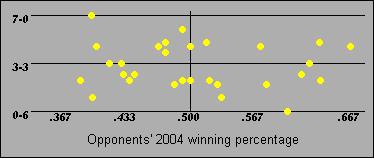
As soon as the NFL regular season concludes, each team knows which opponents it will face the next year, because the matchups are determined by formula. But it isn't until April that the league announces the actual schedule -- who will play where and when. At that point, each team in the league reviews its slate and declares that the schedule-makers have screwed them over.
As TMQ regularly observes, someone has to get "cheated." Every week, someone has to play the Steelers. For every game, someone has to go on the road. Most of the time, when someone in the NFL is complaining about the schedule, he's just trying to lower expectations. If a team's upcoming five-game stretch is going to be the most grueling month a group of men has endured since July 1916, then they can be forgiven for winning only two or three.
But this year, at least one team has a legitimate grievance. Many, many times in the past week, we've heard the San Diego Chargers referred to as the best 3-4 team in history. In the first seven games of the season, the Chargers have had to play four teams that made the playoffs last season, including both Super Bowl teams as well as last year's AFC runner-up, the 15-1 Pittsburgh Steelers. Nobody in the league has had to face a tougher schedule than the Chargers, right?
Well, it depends how you judge strength of schedule. Based on records from last season, the Chargers have actually played the fifth-toughest schedule so far this year. The New England Patriots, another team whose early-season schedule has been cited as particularly brutal, have faced the fourth-toughest overall slate. The Patriots have already had to play four of last year's playoff teams -- the Chargers, Steelers, Falcons and Broncos -- plus the Panthers, whom many see as a playoff contender in 2005. So who's had the toughest schedule so far, at least on paper? The Jacksonville Jaguars, definitely. They've played teams that last year combined for a .667 winning percentage, and of their six games, five have been against teams that were in the playoffs last year: the Seahawks, Colts, Jets, Broncos and Steelers. Four of those teams, all but the Jets, should be back in the playoffs this year. And the Jags' sixth game was against the Bengals, who also are on track for the postseason.
We do need to consider that the Chargers' schedule has already included road trips of 3,000 miles to Foxboro and 2,600 to Philadelphia. The Jaguars, meanwhile, haven't had any games outside the Eastern time zone, and the Patriots have had only one, in Denver. So the Chargers very well may have had the hardest schedule. Beyond the Chargers, what can we learn from looking at strength of schedule?
Two questions we need to ask: 1) Is it fair to judge this year's schedules based on last year's records? 2) Do those 2004 records really have any bearing? I believe the answer is yes to both. Before the season even started, people were pointing to the Chargers' and Patriots' schedules as tough and at the Colts' and Bengals' as easy. And those early assessments have been borne out. Sure, some teams appear to have reversed gears: The Vikings and Jets are worse; the Buccaneers and Chiefs are better. But because this season is still young, teams are just settling into their identities. Last year's performance gives us useful benchmarks by which to gauge a team's value as an opponent: whether that team made the playoffs, and whether that team had at least 10 wins, the break point for being considered "good."
One other question: Why even look at strength of schedule at this point in the season? Because divisional play is about to begin in earnest. Twenty-eight of the league's 32 teams have played two or fewer divisional games. The hardest-fought stretch of the season is about to get rolling, and this is a good time to take stock of what the teams have faced to this point.
Besides, charts, graphs and the adding together of the numbers are what we do here at Down and Distance. So here's a look at the strength of the schedule each NFL team has had to face this year. The chart lists the 2004 winning percentage of each team's opponents so far this year; the number of 2004 playoff teams ("P.T.") each team has faced; and the number of 10-win teams ("10+") it has faced. For illustration purposes, AFC teams are listed in white, NFC teams in green:
| TEAM | PCT | P.T. | 10+ | W-L |
| Jaguars | .667 | 5 | 4 | 4-2 |
| Raiders | .635 | 3 | 3 | 2-4 |
| Falcons | .634 | 5 | 3 | 5-2 |
| Patriots | .625 | 4 | 4 | 3-3 |
| Chargers | .616 | 4 | 4 | 3-4 |
| Texans | .604 | 3 | 2 | 0-6 |
| Titans | .580 | 3 | 2 | 2-5 |
| Steelers | .573 | 2 | 2 | 4-2 |
| 49ers | .531 | 3 | 2 | 1-5 |
| Saints | .527 | 4 | 2 | 2-5 |
| Browns | .521 | 2 | 2 | 2-4 |
| Broncos | .518 | 2 | 2 | 5-2 |
| Chiefs | .500 | 3 | 3 | 4-2 |
| Dolphins | .500 | 2 | 2 | 2-4 |
| Giants | .500 | 3 | 2 | 4-2 |
| Panthers | .500 | 2 | 2 | 4-2 |
| Buccaneers | .490 | 3 | 2 | 5-1 |
| Vikings | .490 | 2 | 2 | 2-4 |
| Jets | .482 | 1 | 1 | 2-5 |
| Bengals | .473 | 2 | 1 | 5-2 |
| Cowboys | .473 | 3 | 2 | 4-3 |
| Seahawks | .473 | 2 | 1 | 5-2 |
| Eagles | .469 | 2 | 2 | 4-2 |
| Bills | .446 | 2 | 2 | 3-4 |
| Ravens | .438 | 2 | 2 | 2-4 |
| Rams | .429 | 2 | 1 | 3-4 |
| Bears | .427 | 1 | 0 | 3-3 |
| Lions | .417 | 1 | 1 | 3-3 |
| Redskins | .406 | 2 | 1 | 4-2 |
| Packers | .396 | 1 | 0 | 1-5 |
| Colts | .393 | 1 | 0 | 7-0 |
| Cardinals | .385 | 2 | 0 | 2-4 |
Several things jump right out at you:
The AFC's dominance in 2004 is validated yet again. Seven of the eight toughest schedules and 11 of the top 14 have been played by AFC teams. That's because an AFC schedule is inherently tougher than an NFC schedule. Last year, the AFC as a whole had a .547 winning percentage. The NFC's percentage was just .453. Every team plays three-quarters of their games within their own conference, which means more tough foes for AFC teams, more "light" foes for NFC teams.
The skepticism about the Colts is well-placed. The only thing we've heard more often than "the Chargers are better than their record" is "the Colts haven't played anybody yet." While the Chargers, Patriots, Jaguars and Falcons have each played at least four playoff teams, the Colts have faced just one: the St. Louis Rams, who at 8-8 last year made the playoffs not because they deserved it but because the NFC didn't have anyone else to send. Further, the Colts are one of only four teams not to have faced a single 10-win club, and they've gotten to play the two worst teams in the NFL: the Texans and 49ers. Their toughest opponent so far: the Jaguars, 9-7 in 2004. All that said, however, it is a Down and Distance house rule that no team should ever be punished for doing all that's asked of it. The Colts can only play the games that are on their schedule, and they're 7-0 in those games. They haven't lost to any of these weaklings. So I'll be skeptical, but not yet critical.
There are good signs and not-so-good signs for the Redskins. At 4-2, Washington has been impressive this year, especially compared with the past three seasons. But keep in mind that they've played one 10-win club, the Broncos, and lost. They have three wins over significantly improved teams -- the Bears, Cowboys and Seahawks -- but those victories came by a total of six points. Their one convincing victory was over the 49ers.
A "soft" schedule doesn't guarantee a winner. The only team with a weaker schedule than the Colts has been the Cardinals, but they've won just two games, over the 49ers and Titans. The Packers haven't played a single 10-win team, either, and the one playoff team they've faced is the pathetic Vikings. They did give both Tampa Bay and Carolina a hard time, and both those teams will contend for the playoffs this year ... but 1-5 is still 1-5, Irma!
A tough schedule can explain only so much. People are willing to cut the Chargers some slack because they've lost four games by a total of 12 points (3 per game). The 49ers, with the second-toughest schedule in the NFC, have lost five games by a total of 119 points (24 per game). The Texans, with the sixth-toughest schedule in the whole league, have lost six by 105 (18 per game). When you roll over like that week after week, it doesn't much matter what your schedule looks like. You stink.
There's no direct correlation. The horizontal axis in the graph below represents the combined winning percentage of the 32 teams' opponents, ranging from .385 for the Cardinals to .667 for the Jaguars; the vertical axis is the teams' records, ranging from 0-6 Houston to 7-0 Indianapolis:

At season's end, we'll revisit these numbers, comparing this year's strength of schedule vs. final records. If we're lucky, we'll have devised a way to get rich by wagering. If we're unlucky, we'll have proved that strength of schedule is a canard, and the wheels will be in motion toward a college playoff. Bwa-ha-ha.


1 comment:
There's a science to being a high draft pick for the Cardinals: You show up, you get a reputation as a bust (or you get hurt), the team cuts you, you sign somewhere else and you go on to become a mid-level star. This applies in most cases, except for David Boston, who actually gave the Cards his "best," then fell apart somewhere else.
Post a Comment